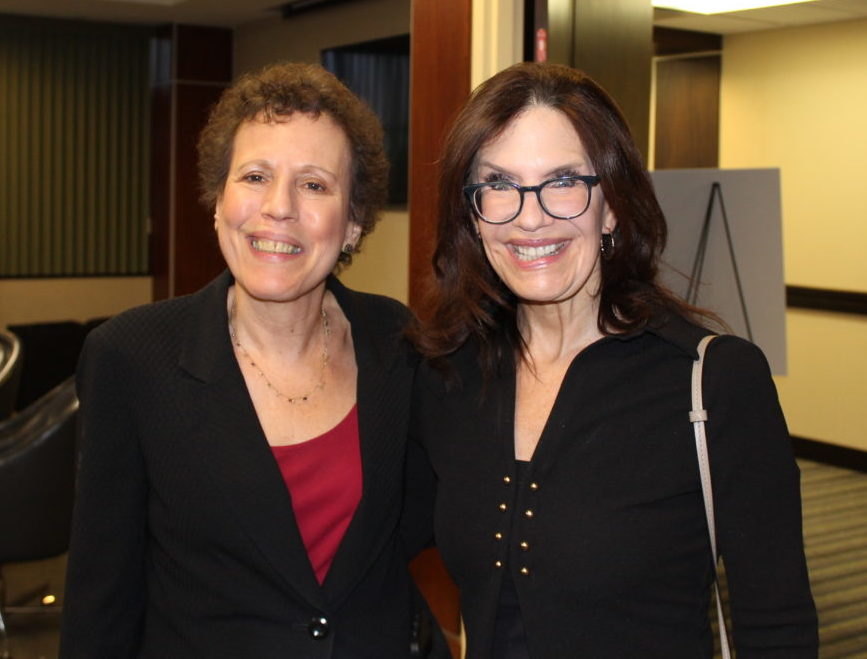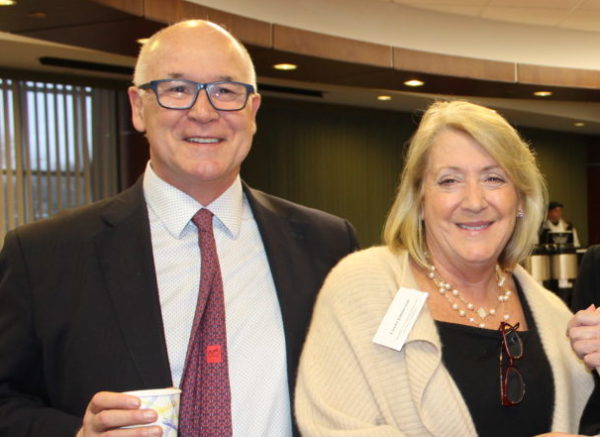It was a day to celebrate politicians who made significant contributions to their native New York state as Westfair Communications Inc. held its first literary luncheon Thursday, Feb. 23, at 1133 Westchester Ave. in White Plains.

“Literary Westfair” brought together Mary Calvi, https://www.marycalvi.com/ the 12-time New York Emmy Award-winning WCBS-TV anchor, who read from her new book, “If a Poem Could Live and Breathe: A Novel of Teddy Roosevelt”™s First Love” (St. Martin”™s Press), plumbing the tragic relationship between the larger-than-life former New York state governor and 26th president of the United States (1858-1919) and his first wife, the former Alice Hathaway Lee; and John A. Lipman, who read from his new biography, “Alfred B. DelBello: His Life and Times (Atmosphere Press), https://atmospherepress.com/books/alfred-b-delbello-his-life-and-times-by-john-a-lipman/ exploring the onetime Yonkers mayor, Westchester County Executive and New York state lieutenant governor.

What was perhaps most striking about the afternoon, billed as “History: Fiction and Nonfiction,” was how many echoes there were between Calvi”™s and Lipman”™s works despite their taking different approaches to history. Both Calvi and DelBello, Lipman”™s subject, have had strong ties to Yonkers. Calvi, born and raised there, is married to Yonkers”™ Mayor Mike Spano. DelBello (1934-2015), also born and raised in Yonkers, served as mayor there from 1970 to ”™73, and Lipman read a colorful passage about how a man well-known for reaching across the aisle immediately sought consensus there to raise the economy and quality of life in the city ”” releasing sanitation and other municipal services from the stranglehold of the patronage system.
As a writer and consultant specializing in political communications and public policy ”” one who has written extensively on legislative and environmental issues ”” it was only natural for Lipman to use primary sources ranging from newspaper clippings to interviews with DelBello aides for his biography. (Lipman”™s mother, the late Doris D. Lipman, served as DelBello”™s martinet scheduler and coordinator when he was Westchester County Executive, and the author recalled meeting DelBello and wife Dee, Westfair”™s publisher, as a child and handing out leaflets for his campaigns.)

But Calvi, too, has been scrupulous in researching her two historical novels, so much so that the first, “Dear George, Dear Mary: A Novel of George Washington”™s First Love” ”” about Mary Philipse, the spirited Loyalist heiress of Philipse Manor Hall, the now-historic Yonkers site that inspired Calvi”™s literary career ”” was the basis of a Smithsonian Channel documentary.”¯In researching her second novel, Calvi uncovered what she called a “treasure trove” of love letters housed at Harvard University between Harvard alumnus Roosevelt and his first wife. It was a relationship cut poignantly short when she died of kidney disease two days after giving birth to their only child, named Alice for her mother. To compound the tragedy, Roosevelt”™s mother, the former Martha Bulloch, had died earlier the same day ”” Feb. 14, 1884. (To bring the story full circle, Calvi”™s book was published on Valentine”™s Day of this year. Among its fans are former President Bill Clinton, who raved about it when he visited Scattered Books in his hometown of Chappaqua, said a representative from the store, a vendor at the event.)
“If a Poem Could Live and Breathe” exposes the myth that Alice Roosevelt played a little role in her husband”™s life. He never spoke or wrote about her after her death ”” not because she was an insipid socialite who meant little to him, Calvi said, but because she, a woman who, in the words of the novel, encompassed every season, meant too much. In any event, the tragic circumstances of the double death would plunge the restless Roosevelt into further political and physical action ”” “black care rarely sits behind a rider whose pace is fast enough,” he later wrote of grief and depression ”” driving a wedge between himself and his tart-tongued, independent oldest child, an early-20th century symbol of the new modern American woman. Today, Teddy Roosevelt is a controversial figure whose statue was removed from the front of the American Museum of Natural History in Manhattan, which his father, Theodore Sr., helped found, because of its imperialist depiction. But Calvi said the love letters reveal a progressive who believed in equal rights for women ”” a quality the Republican shared with the Democrat DelBello.
As luncheon moderator ”” and Westfair”™s longtime cultural writer and luxury editor ”” I concluded the readings with one from my new historical thriller, “Riddle Me This” (JMS Books) https://www.jms-books.com/georgette-gouveia-c-224_411/riddle-me-this-p-4461.html ”” exploring the creation of Giacomo Puccini”™s opera “Turandot” against the backdrop of the legends of Alexander the Great, which may have inspired it, and a futuristic tale of international espionage that mirrors the opera”™s battle-of-the-sexes, East-versus-West plot. The author interviews, readings and buffet luncheon were rounded out with a thought-provoking question-and-answer session with some 60 attendees and a book signing in a sleek conference room of Robert P. Weisz”™s RPW Group office building.
In the audience Q and A, Lipman said that in writing “Alfred B. DelBello” he was coincidentally inspired by Edmund Morris”™ biography of Roosevelt, “Theodore Rex.” Calvi mentioned she was intrigued by former President Abraham Lincoln and his first love, Ann Rutledge ”” a subject hotly debated by historians.
Having written about two women who might”™ve been first lady but for circumstances, might Calvi have a third in Rutledge?



















